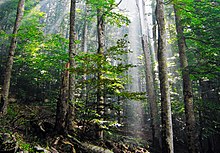Oecologia profunda
Oecologia profunda est hodierna philosophia oecologica de circumiectis naturalibus, cuius maximae proprietates sunt inhaerentem entitatum vivorum dignitatem suadere, eorum instrumentalem hominibus utilitatem neglegens, contra anthropocentrismum, et totam hodiernarum societatum humanarum confectionem secundam tales notiones suadere. Oecologia profunda affirmat mundum naturalem ex subtili multiplicum coniunctionum aequilibrio constare, in quibus exsistentia organismorum in exsistentia aliorum intra oecosystemata nititur.[1] Intercessio humana vel exitium rerum naturae ergo non solum hominibus, sed omnibus organismis qui ordinem naturae constitunt minatur.




Primi homines auctoritatis gravis
recensereNotabiles oecologiae profundae suasores
recensere- David Abram
- Michael Asher
- Judi Bari
- Thomas Berry
- Wendell Berry
- Leonardus Boff
- Fridtjof Capra
- Savitri Devi[2]
- Michael Dowd
- Vivienne Elanta
- David Foreman
- Warwick Fox
- Chellis Glendinning
- Eduardus Goldsmith
- Felix Guattari
- Paulus Hawken
- Martinus Heidegger
- Iulia Butterfly Hill
- Derrick Jensen
- Bernardus Krause
- Satish Kumar
- Dolores LaChapelle
- Gilbertus LaFreniere
- Pentti Linkola
- Ioannes Livingston
- Ioanna Macy
- Jerry Mander
- Freya Mathews
- Terentius McKenna
- W. S. Merwin
- Arne Næss
- Petrus Newman
- David Orton
- Val Plumwood
- Theodorus Roszak
- Ioannes Seed
- Paulus Shepard
- Vandana Shiva
- Gary Snyder
- Ricardus Sylvan
- Douglas Tompkins
- Oberon Zell-Ravenheart
- Ioannes Zerzan
Periodica academica pertinentia
recensereNexus interni
- Biocentrismus
- Decrementum
- Coniectura biophiliae
- Liberatio telluris
- Neotribalismus
- Oecocentrismus
- Oecocommunalismus
- Oecologia humana
- Oecosophia
- Oecotheologia
- Motus voluntariae exstinctionis generis humani
- Simplicitas voluntaria
- Theoria Gaeae
- ATWA
- Coupled human-environment system
- Ecosystem-based management
- Environmental psychology
- Intrinsic value (animal ethics)
- Negative Population Growth
- Population Connection
- Sustainable development
- The Revenge of Gaia
- Voluntary Human Extinction Movement-->
Notae
recensere- ↑ Oecosystemata in aliis oecosystematibus intra biosphaerium niti etiam habentur.
- ↑ Goodrick-Clarke 1998
Bibliographia
recensere- Bender, F. L. 2003. The Culture of Extinction: Toward a Philosophy of Deep Ecology. Amherst Novi Eboraci: Humanity Books.
- Devall, W., et G. Sessions. 1985. Deep Ecology: Living as if Nature Mattered. Salt Lake City: Gibbs M. Smith, Inc.
- Drengson, Alan. 1995. The Deep Ecology Movement.
- Katz, E., A. Light, et al. 2000. Beneath the Surface: Critical Essays in the Philosophy of Deep Ecology. Cantabrigiae Massachusettae: MIT Press.
- LaChapelle, D. 1992. Sacred Land, Sacred Sex: Rapture of the Deep. Durango: Kivakí Press.
- Næss, A. 1989. Ecology, Community and Lifestyle: Outline of an Ecosophy. Conv. D. Rothenberg. Cantabrigiae: Cambridge University Press.
- Nelson, C. 2006. Ecofeminism vs. Deep Ecology. Dialogue, San Antonio Texiae: Saint Mary's University Department of Philosophy.
- Passmore, J. 1974. Man’s Responsibility for Nature. Londinii: Duckworth.
- Sessions, G., ed. 1995. Deep Ecology for the Twenty-first Century. Bostoniae: Shambhala.
- Taylor, B., et M. Zimmerman. 2005. Deep Ecology. In Encyclopedia of Religion and Nature, vol. 1, ed. B. Taylor, 456–460. Londinii: Continuum International.
Bibliographia addita
recensere- Abram, David. 1996. The Spell of the Sensuous: Perception and Language in a More-than-Human World. Pantheon Books.
- Conesa-Sevilla, J. 2006. The Intrinsic Value of the Whole: Cognitive and utilitarian evaluative processes as they pertain to ecocentric, deep ecological, and ecopsychological "valuing." The Trumpeter 22(2):26-42.
- Curry, Patrick. 2011. Ecological Ethics: An Introduction. Polity. ISBN 9780745651255.
- Glasser, Harold, ed. 2005. The Selected Works of Arne Næss. 10 vol. Springer Science+Business Media. ISBN 1402037279.
- Goodrick-Clarke, Nicholas. 1998. Hitler's Priestess: Savitri Devi, the Hindu-Aryan Myth, and Neo-Nazism. Novi Eboraci: New York University Press. ISBN 0814731104.
- Griffin, Susan. 1978. Woman and Nature. Harper Collins.
- Keulartz, Jozef. 1998. Struggle for nature: a critique of radical ecology. Londinii: Routledge.
- Huesemann, Michael H., et Joyce A. Huesemann. 2011. The Need for a Different World View. In Technofix: Why Technology Won’t Save Us or the Environment, capitulum 12. Gabriolae (in insula) Columbiae Britannicae: New Society Publishers. ISBN 0865717044.
- Kull, Kalevi. 2011. Foundations for ecosemiotic deep ecology. In The Space of Culture: The Place of Nature in Estonia and Beyond, ed. Tiina Peil, 69–75. Approaches to Culture Theory, 1. Tartu: Tartu University Press.
- Merchant, Carolyn. 1990. The Death of Nature. HarperOne. ISBN 0062505955, ISBN 9780062505958.
- de Steiguer, J. E. 2006. The Origins of Modern Environmental Thought. Tucson: University of Arizona Press.
- Sylvan, Richard. 1985a. A Critique of Deep Ecology, Part I. Radical Philosophy 40:2–12.
- Sylvan, Richard. 1985b. A Critique of Deep Ecology, Part II. Radical Philosophy 41:1–22.
- Tobias, Michael, ed. (1984), 1988.. Deep Ecology. Avant Books. ISBN 0932238130.
- Turner, Jack. 1996. The Abstract Wild. Tucson: University of Arizona Press.